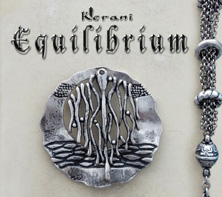 Belgium-born
/ Holland-based Kerani is making inroads in the New Age music
world with her latest masterpiece called Equilibrium.
On Equilibrium, lush and scenic soundscapes merge into a wonderful
tapestry of sound making the 9 track CD an instrumental, neoclassical
/ New Age wonder. Although Kerani has already released several albums,
Equilibrium is finally the album that may just put this very
talented lady on the musical map. Commenting on her sonic mission
with Equilibrium, Kerani explains, ‘The concept for
the Equilibrium album, and the title track, comes from my dream of
a world where the male and female energies are in balance and in harmony,
where men and women accept and respect each other as they are and
treat each other as equals. The music this album honors is the highest
feminine energy.’ Apart from Kerani’s stated concepts,
her music truly transcends words alone. In addition to her keyboards
and synths, Kerani sometimes weaves in subtle, wordless vocals to
her music, adding further intrigue to her already otherworldly instrumental
sound. Several musicians assist Kerani on the CD including guitarist
Romain van Beek along with a range of string players. Fans
of Enya, Yanni, Oldfield and other groundbreaking New Age instrumental
music icons will thoroughly enjoy Kerani’s uniquely deep and
meditative approach on Equilibrium. www.kerani.nl
Belgium-born
/ Holland-based Kerani is making inroads in the New Age music
world with her latest masterpiece called Equilibrium.
On Equilibrium, lush and scenic soundscapes merge into a wonderful
tapestry of sound making the 9 track CD an instrumental, neoclassical
/ New Age wonder. Although Kerani has already released several albums,
Equilibrium is finally the album that may just put this very
talented lady on the musical map. Commenting on her sonic mission
with Equilibrium, Kerani explains, ‘The concept for
the Equilibrium album, and the title track, comes from my dream of
a world where the male and female energies are in balance and in harmony,
where men and women accept and respect each other as they are and
treat each other as equals. The music this album honors is the highest
feminine energy.’ Apart from Kerani’s stated concepts,
her music truly transcends words alone. In addition to her keyboards
and synths, Kerani sometimes weaves in subtle, wordless vocals to
her music, adding further intrigue to her already otherworldly instrumental
sound. Several musicians assist Kerani on the CD including guitarist
Romain van Beek along with a range of string players. Fans
of Enya, Yanni, Oldfield and other groundbreaking New Age instrumental
music icons will thoroughly enjoy Kerani’s uniquely deep and
meditative approach on Equilibrium. www.kerani.nl
mwe3.com
presents an interview with
KERANI
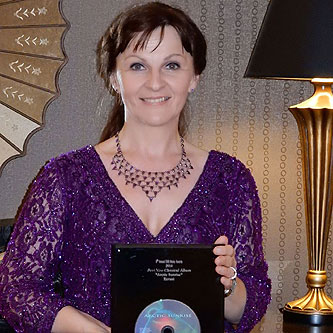 mwe3:
On Equilibrium you say that you wanted to pay homage to women
and that you would hope to see the male-female balance on Earth restored.
Why do you think women have not yet been given the proper amount of
respect for their many roles in society and can we change those things
for the future?
mwe3:
On Equilibrium you say that you wanted to pay homage to women
and that you would hope to see the male-female balance on Earth restored.
Why do you think women have not yet been given the proper amount of
respect for their many roles in society and can we change those things
for the future?
Kerani: Because women have been housebound for so long - doing
the household, taking care of the children, etc. - their role has
become a given over the past centuries. Today, as they are actively
taking part in society, women often have to work twice as hard to
be accepted by their male peers.
Surely, there are several ways to restore the balance, but one of
the quickest and most obvious ways is to abandon our old-fashioned
way of thinking and allowing women to hold more important functions.
mwe3: What other albums have you released and how would you
compare Equilibrium with your earlier works? How do you feel
your music has changed or evolved over the years?
Kerani: Equilibrium is my 4th album and is quite different
from the previous ones. My first album, called Wings of Comfort,
was released in 2011. It contains 3 long, meditative pieces and is
ideal for yoga and meditation. The Journey (2012), its successor,
consists of visual pieces describing various landscapes (valleys,
mountains, meadows, etc). My 3rd brainchild, called Arctic Sunrise
(2014), is a tribute to the cold, ice covered regions on our planet.
On this concept album, I integrated live instruments, such as violin,
cello, brass, electric guitar and flute to enrich the overall sound.
The same was done with Equilibrium. This album features some
very fine performances of outstanding musicians such as Rodrigo Rodriguez
who plays the shakuhachi on the track “Fragrant Mountain”.
Rodrigo, who is originally from Argentina, studied classical and traditional
Japanese music with famous shakuhachi masters in Japan.
Then there is Romain van Beek, a classically trained guitarist, whom
I absolutely love working with. His improvisations are second to none!
Comparing Equilibrium with my previous works, I would say that
it is much more mature. The compositions are complex and layered...
there is always counter melody and if you listen carefully, you can
detect a third melody woven into it. There is a lot going on below
the surface, so you would have to listen several times to hear every
detail in order to get the whole picture.
 mwe3:
You have an interesting background. Can you tell us where you’re
from? What do you like best about living in Holland? The country has
such a rich musical history and in some respects was a beacon for
20th century rock, both vocal and instrumental music.
mwe3:
You have an interesting background. Can you tell us where you’re
from? What do you like best about living in Holland? The country has
such a rich musical history and in some respects was a beacon for
20th century rock, both vocal and instrumental music.
Kerani: I was born and raised near Brussels, the capital of
Belgium. What I liked most about Brussels, was its multicultural character.
It is such a vibrant and lively city! In 2000, I moved to Italy where
I gave English language lessons. It was a good period in my life,
but musically, nothing much happened during those 3 years.
I have lived in the Netherlands since 2003 and I don’t think
that I will ever move again. I am in love with this country. The people
are friendly, but straightforward; they will always give their honest
opinion. No beating about the bush!
Holland was indeed famous for its rock bands in the past, like Golden
Earring, Earth & Fire, Herman Brood – to name just a few.
The music scene is very much alive today in practically all styles
and disciplines: classical as well as contemporary. And of course,
who doesn’t know our world famous DJ’s Tiësto, Hardwell,
Armin van Buuren and Afrojack?
mwe3: You grew up listening to the classical music masters
like Mozart, Liszt and Shumann. What are some of your favorite classical
works and why and how does that love of the great classical masters
compare with your interest and appreciation for the early electronic
New Age meets rock sound of say Mike Oldfield and Jean Michel Jarre
for instance? Does rock and New Age share certain key characteristics
or dynamics?
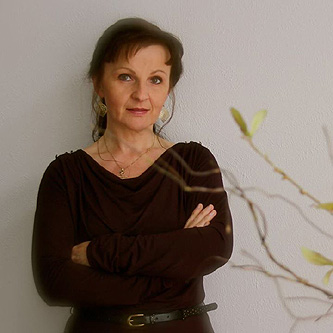 Kerani:
I am very fond of classical music, especially from the Romantic Era.
My favorite works are:
Kerani:
I am very fond of classical music, especially from the Romantic Era.
My favorite works are:
- The Piano Concerto in A minor, Op 54 from Schumann, which I like
for its melody and dynamics.
- The second movement of the Concerto for Flute, Harp, and Orchestra
in C major, K299 by Mozart, for its subtlety. This piece is as light
as a feather and every note is in the right place.
- I can’t choose from Liszt’s repertoire. They are all equally
brilliant.
- The second movement of Beethoven’s Piano Concert Nr 5 in E
minor, Op. 73, stirs something deep within me each time I listen to
it. The piece starts with an incredible light and brittle piano melody,
which turns into a fierce statement, only a few minutes later. So
very typical of Beethoven! He was a man of extreme emotions.
It is not strange to say that classical, rock, electronic and new
age music share the same basic characteristics and dynamics. Take
Jean-Michel Jarre, for instance. His father, Maurice Jarre, was a
classical composer, who wrote the soundtracks for several films, such
as Lawrence Of Arabia and Doctor Zhivago. I am sure
that Jean-Michel was influenced by his father’s works and as
a trained musician, he could have easily opted to write classical
pieces too, yet he chose a different style. The same can actually
be said about Mike Oldfield, whose work blends progressive rock with
folk, classical, electronic and new age music.
The build up and structure of my compositions is very similar to a
classical piece, i.e. I mostly elaborate on the main theme and let
it come back with variations in orchestration and an additional countermelody...
or two!
There are many elements in classical music that I often incorporate
in my music. If you listen to “Anchoress” – 3rd track
on Equilibrium – you can hear the marriage of synthesizer
sounds with cello, piano, choir and pizzicato strings…. all of
which blends very well. It has resulted in a “contemporary baroque-style”.
mwe3: Can you remember your early connections to music and
what were your early studies like? What are the keyboards you perform
on the Equilibrium CD?
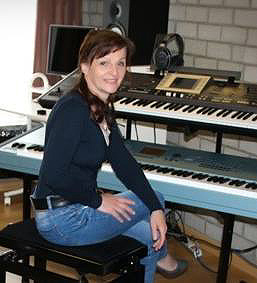 Kerani:
Well, I played the keyboards in a cover band in my early twenties.
It was fun and we did a few gigs, but deep down I knew that I wanted
something else. I left the band after 2 years and focused even more
on writing my own music. Despite my meager means as a language student,
I had a tiny studio with a piano, a midi-keyboard and a computer.
Looking back, it was very primitive compared to the big professional
recording studio (Kerani Music Studio) that I am running with my partner
today.
Kerani:
Well, I played the keyboards in a cover band in my early twenties.
It was fun and we did a few gigs, but deep down I knew that I wanted
something else. I left the band after 2 years and focused even more
on writing my own music. Despite my meager means as a language student,
I had a tiny studio with a piano, a midi-keyboard and a computer.
Looking back, it was very primitive compared to the big professional
recording studio (Kerani Music Studio) that I am running with my partner
today.
mwe3: Where was the Equilibrium album created and what
can you tell us about your recording studio and who else was involved
in helping you with getting the right sound on the CD? Also can you
tell us something about the design of the front cover art?
Kerani: Equilibrium was composed on my precious Yamaha
Motif XS8 workstation, which stands in my workroom below the studio.
The arrangements were written there as well. When I was satisfied
with the songs, the music was digitally transferred to the control
room in the studio where the sounds were perfected, vocals added and
the live instruments recorded.
The person behind the entire production is my extremely talented and
knowledgeable partner Arno Op den Camp. He is a classically trained
musician who has also studied sound design and sound engineering.
He has been in the music business for 25 years.
The front cover depicts a piece of jewelry that was given to me by
my mother-in-law. In the official album trailer on YouTube, you can
see me holding it in my hand, moving the upper part from left to right
over the base of the jewel…. just like the needle of a scale
would search for its balance. I photographed the jewel and it turned
out beautifully! So we made it the front cover of the album.
Kerani – Introducing
Equilibrium
mwe3: Your family has come from various European countries.
How do you compare the different cultures, music and languages from
the different countries? Is music the international language? There’s
so much to fathom! And what other countries do you like to visit?
 Kerani:
My father was Hungarian and my mother was of German descent. Hungarian
is my mother tongue; we never spoke German at home. I picked up Dutch
at the age of 5 when I started attending school. Some of my friends
only spoke French!
Kerani:
My father was Hungarian and my mother was of German descent. Hungarian
is my mother tongue; we never spoke German at home. I picked up Dutch
at the age of 5 when I started attending school. Some of my friends
only spoke French!
Europe is a collective of different customs, mentalities, traditions
and languages and each country is famous or notorious for something.
We often joke about each other! The only thing we really have in common
is music; and although there are countless styles, we all understand
the universal language of music.
Growing up in this amalgam of cultures and languages has enriched
my soul and enhanced my understanding of the world and its people.
You could say that it has made me what I am today: a world citizen.
mwe3: Your music is very meditative. How do you balance that
meditative aspect with the more traditional aspects of religion that
is still predominant in western cultures. I think the New Age philosophies
of the 20th century aren’t nearly as ancient as the more indoctrinated
aspects or organized religion. Are both compatible with each other
or will the more New Age aspects of humanity win over the more rigid
religious beliefs of centuries past?
Kerani: I was brought up Roman-Catholic and attended 2 very
severe nun schools in Brussels. We had to pray several times per day
and go to confession once a month. We were also told to fear God.
This probably sounds medieval, but I am really talking about the 1970s!
Luckily, I was sane enough to put things into perspective and by the
time I was 18 and ready for college, I had read a good amount of books
about spirituality. Without abandoning my Catholic faith, I managed
to broaden my horizon and look beyond the confining and enforced rituals
of a religion. But I am not someone who holds grudges. “O, Aeterne
Deus”, the 6th track on my new album, was inspired by my love
of medieval Gregorian chants and the deeply spiritual atmosphere they
created. Part of the song uses the original lyrics of a 900-year old
antiphon written by the German abbess Hildegard von Bingen, who was
also the first female composer recorded in history.
So, yes, it is possible to combine elements of the religion that one
was brought up in with New Age philosophies. One only has to find
the right balance.
 mwe3:
How did you choose all the great musicians who work with you on the
Equilibrium album? There’s so many fine players on Equilibrium,
including guitarist Romain van Beek. I know you’re a big
fan of Mike Oldfield, who kind of pioneered that sonic New Age guitar
sound in the early 1970s. Be great if you could incorporate more of
that as a counterpoint to your keyboards next time! Maybe Terry and
Mike on a track?
mwe3:
How did you choose all the great musicians who work with you on the
Equilibrium album? There’s so many fine players on Equilibrium,
including guitarist Romain van Beek. I know you’re a big
fan of Mike Oldfield, who kind of pioneered that sonic New Age guitar
sound in the early 1970s. Be great if you could incorporate more of
that as a counterpoint to your keyboards next time! Maybe Terry and
Mike on a track?
Kerani: Most of the musicians who collaborated on Equilibrium
have also worked on other projects in our studio. They are all professionals.
Wilfred Sassen for instance, is the concertmaster of the South-Netherlands
Philharmonic Orchestra.
I had the privilege of accompanying Terry Oldfield, who gave a concert
in our studio just a few months ago, on the keyboard. It was a fantastic
experience! We have not talked about a possible collaboration, but
I am sure that he would agree to feature on my next album if I asked
him. I am far less sure about his brother, though. Mike is very set
on protecting his privacy. He is quite shy!
mwe3: There’s so many highlights on Equilibrium, especially
the title track, while equally brilliant is “Lady’s Grace”,
which is track seven on the CD. What can you tell us about those tracks
and also what tracks are among your personal favorites and what tracks
are getting the most airplay on different platforms, like radio or
even online places like youtube?
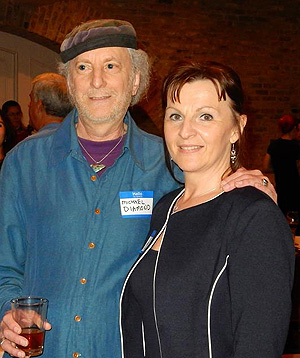 Kerani:
“Equilibrium” is all about my dream of a world where the
male and female energies are in balance and harmony, where men and
women treat each other as equals. Hence the title. I believe this
track has enough strong musical features to create the right atmosphere.
Kerani:
“Equilibrium” is all about my dream of a world where the
male and female energies are in balance and harmony, where men and
women treat each other as equals. Hence the title. I believe this
track has enough strong musical features to create the right atmosphere.
“Lady’s Grace” tries to capture the beauty and elegance
of women. When writing this track, I was particularly inspired by
the fashion and elegant customs of the European courts in the 17th
and 18th centuries. Just think about the long gowns, the sophisticated
hairdos, and snuffboxes!
I don’t have a favorite track. I see Equilibrium as a
book with 9 separate chapters. Each chapter recounts a different story
and each story is unique and beautiful.
According to the playlists that are sent to me, all tracks are getting
more or less equal airplay. “Equilibrium” might be slightly
ahead, but even “O, Aeterne Deus” - which I feared the most
for! - is appreciated by the radio broadcasters and the audience.
mwe3: Tell us about the 2015 Zone Music Reporter awards show
and how that fits in with you bringing your music to a wider audience?
What else do you have planned for your music for the remainder of
2015 as we move into the future?
Kerani: In February, we learnt that Arctic Sunrise was
amongst the 5 last nominees for the ZMR Music Award for Best Neo-Classical
New Age Album of the year. We felt that we had to attend the awards
show, especially to meet the other talented musicians. All the big
names were present: Wouter Kellerman and Ricky Kej, Peter Kater, Jeff
Oster, Carl Weingarten, Randy and Pamela Copus (2002), Darlene Koldenhoven,
Paul Avgerinos, Joseph Akins, Jeff Pearce, etc. It was a magical evening!
Winning the ZMR Award is certainly a recognition of all the hard work
that we have put into creating the album. It has also brought my music
to a wider audience, which I am infinitely grateful for.
 As
for the remainder of 2015 and 2016, I can already reveal that I am
preparing a concert tour with a few guest musicians. We will kick
things off at Kerani Music Studio and travel to different locations
in the Netherlands, Belgium and beyond. These concerts will be announced
on my Facebook page and website. Of course, in the meantime, I will
also be writing new music.
As
for the remainder of 2015 and 2016, I can already reveal that I am
preparing a concert tour with a few guest musicians. We will kick
things off at Kerani Music Studio and travel to different locations
in the Netherlands, Belgium and beyond. These concerts will be announced
on my Facebook page and website. Of course, in the meantime, I will
also be writing new music.
Last but not least, I have also submitted Equilibrium for consideration
in the 58th Grammy Awards. Keep your fingers crossed!
Thanks to Kerani @ www.kerani.nl



